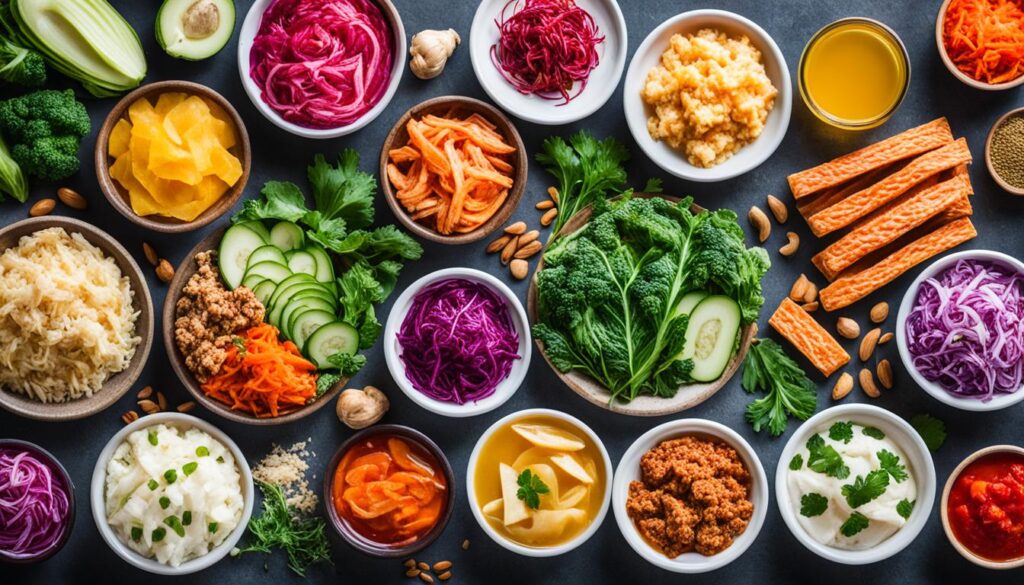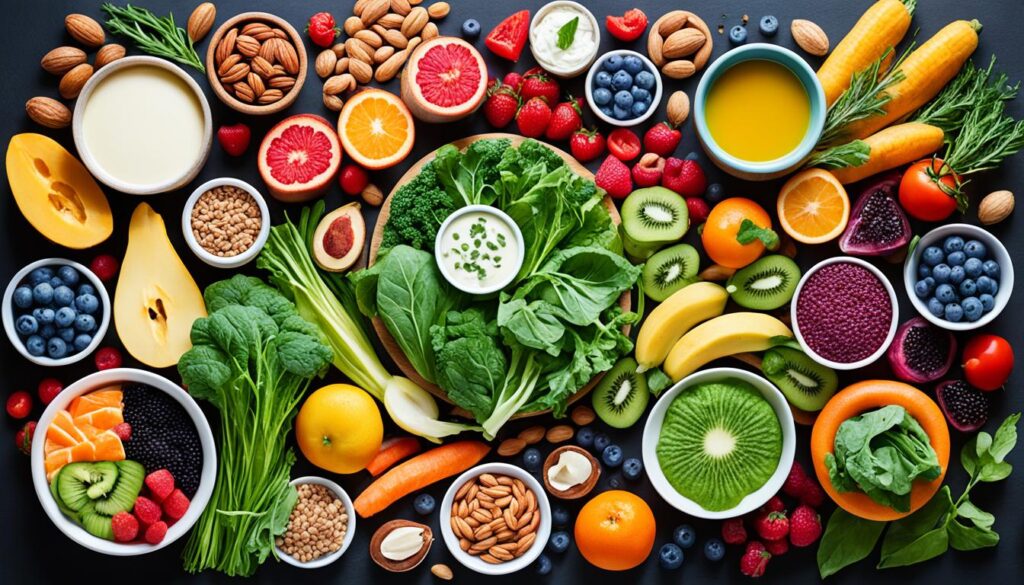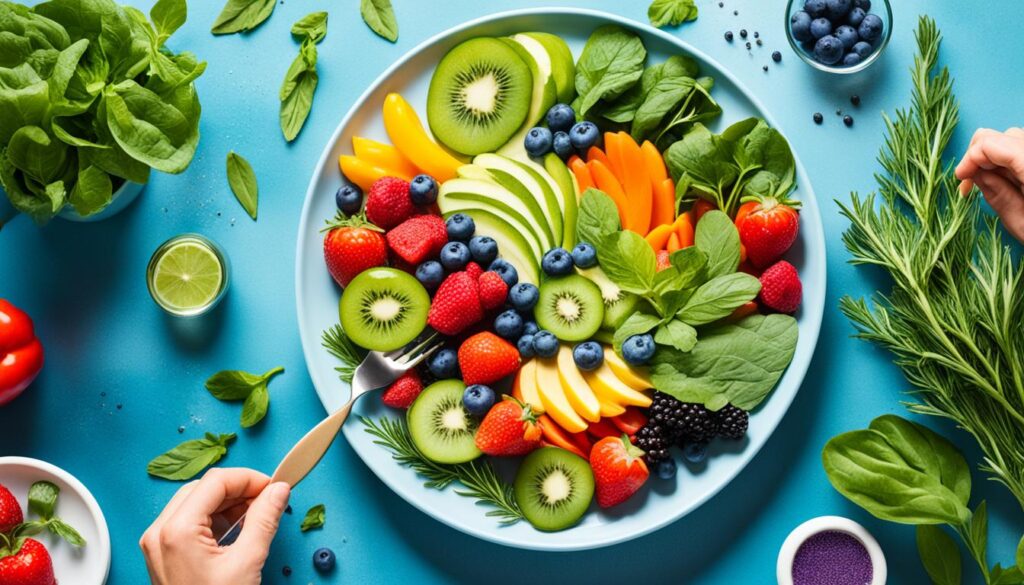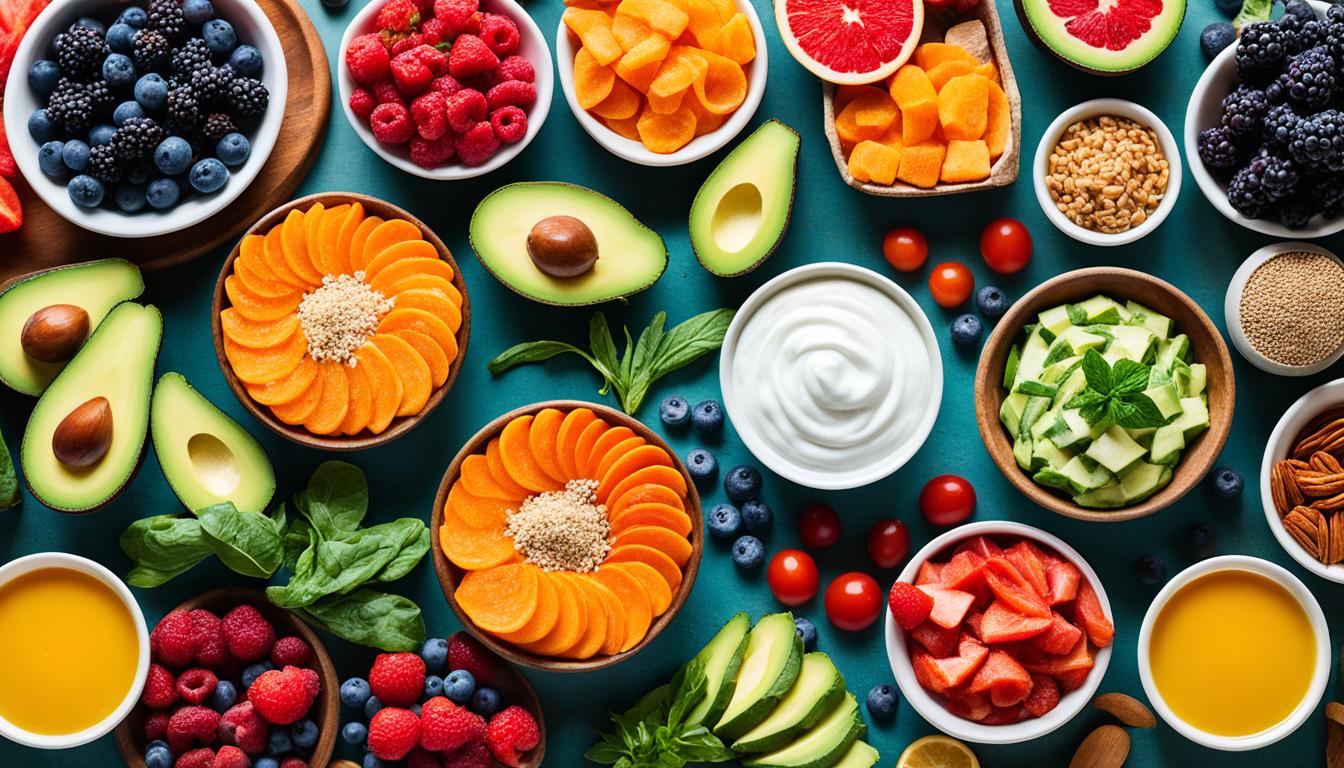A 2021 study in Cell showed that eating probiotic foods daily is great for gut health. Your gut health affects your immune system, mood, and heart health. The food you eat can either help or hurt your gut health.
Eating gut-friendly foods like fermented and fiber-rich foods can boost your gut health. Dietitian Carolyn Williams suggests eating foods like sauerkraut and yogurt with live cultures daily. These foods can make a big difference.
Also, eating prebiotic foods like veggies and fruits is key. These foods feed the good bacteria in your gut.
Key Takeaways
- Probiotic foods can significantly boost overall gut health.
- Plain nonfat Greek yogurt is a powerhouse of probiotics and supports the immune system.
- Consuming kefir can improve your gut microbiome and reduce inflammation.
- Including prebiotic foods like vegetables and fruits helps feed good gut bacteria.
- Fermented foods can enhance gut health.
- Limiting ultra-processed foods and artificial sweeteners is crucial for maintaining a healthy gut.
Understanding Gut Health and Its Importance
Gut health is key to your overall health. It’s all about the balance of tiny organisms in your gut. These tiny bacteria help with digestion, getting nutrients, and getting rid of waste.
The Role of Gut Bacteria
Your gut is home to trillions of bacteria, known as the gut microbiome. These good bacteria are crucial for your health. They help with digestion, boost your immune system, and make important vitamins. They also help with gut health by breaking down tough carbs and fiber.
Not having the right balance of gut bacteria can cause health problems. For example, it can lead to digestive issues and mental health problems. Eating foods like sauerkraut, asparagus, and pineapple can help keep your gut bacteria in balance.
Gut-Brain Axis
The link between your gut and brain is called the gut-brain axis. It’s a complex system that lets them talk to each other. This means your gut health can affect your brain health, and vice versa. The gut-brain axis helps control your mood, thinking, and stress levels.
Eating foods rich in probiotics and prebiotics can make you feel better mentally and physically. Foods like raw onions, raw garlic, and bone broth can help with this.
“A healthy gut means a healthier mind and body.”
Eating a Mediterranean diet is good for your gut. It’s full of fruits, veggies, and whole grains. Adding these foods to your diet can greatly improve your health. It shows how important diet is for gut health.
Probiotics: The Friendly Bacteria
Probiotics are live microorganisms that are good for your health when eaten in the right amounts. They live in fermented foods and help keep your gut balanced. Eating foods rich in probiotics can greatly improve your gut health.
Sources of Probiotics
There are many fermented foods that are great sources of probiotics. Adding these foods to your meals can boost your digestive health.

- Yogurt: Yogurt is a top source of probiotic bacteria. It’s good for people who can’t digest lactose and helps with bone and gut health.
- Kefir: This fermented milk drink is full of live cultures. It helps with nutrient absorption and supports the immune system.
- Tempeh: Tempeh is a fermented soybean food from Indonesia. It’s a great plant-based way to get probiotics.
- Fermented Vegetables: Foods like sauerkraut, kimchi, and pickles are full of probiotics. For example, one cup of sauerkraut has about 4 grams of fiber, which is good for your gut.
- Miso: Miso is a fermented soybean paste from Japan. It’s good for your digestive health.
- Kombucha: This fermented tea is becoming more popular for its live cultures. It can help with digestion and liver function.
Benefits of Probiotic Foods
Eating probiotic foods can bring many health benefits. These benefits include better gut function and a stronger immune system.
- Digestive Health: Probiotic bacteria help with digestion. They can ease diarrhea and help manage IBS.
- Immune Support: Eating fermented foods often can boost your immune system. This can lower the chance of getting infections.
- Chronic Disease Prevention: A healthy gut microbiome can prevent chronic diseases like heart disease and cancer. It can also reduce inflammation and help brain health, as shown in a 2019 study.
- Nutrient Absorption: Probiotics help with digestion and nutrient absorption. This is good for your overall health.
- Mood Regulation: A healthy gut microbiome can also improve mental health. This can help with depression symptoms, as found in a 2019 study.
In summary, eating foods like yogurt, kefir, and tempeh can greatly improve your gut health and overall well-being.
Prebiotics: Feeding the Good Bacteria
Prebiotics are special fibers that don’t get digested. They are key to keeping your gut healthy by feeding the good bacteria in your colon. Eating foods high in inulin and dietary fiber helps keep your gut microbiome balanced, which is vital for your health.
Top Prebiotic Foods
Here are some top foods that can boost your gut health:
- Artichokes: Full of inulin, a fiber that helps the good bacteria in your gut.
- Garlic: Has sugars that act as prebiotics, helping good bacteria grow.
- Oats: High in beta-glucan, a fiber that’s good for your gut.
- Chicory Root: Most of its fiber is inulin, great for gut health.
- Jerusalem Artichokes: High in inulin, helping with gut fermentation.
- Konjac Root: Has a lot of glucomannan fiber, which is prebiotic.
- Bananas: Can help grow good gut bacteria, improving gut health.
- Barley: Has lots of beta-glucan, aiding gut health.
- Seaweed: Contains polysaccharides that boost short-chain fatty acids, good for the gut.
- Wheat Bran: Has AXOS, which helps healthy Bifidobacteria in the gut.
- Avocados: Linked to more healthy fats and short-chain fatty acids, supporting gut health.
- Cocoa Beans: Full of polyphenols, which are antioxidants and anti-inflammatory.
Health Benefits of Prebiotics
Eating prebiotics has many health perks:
- Supports Gut Health: Feeds the good bacteria, keeping your gut balanced.
- Manages Blood Sugar: Fermented prebiotics can help control blood sugar levels.
- Anti-inflammatory Effects: Prebiotic fibers can reduce inflammation, improving overall health.
| Prebiotic Food | Key Benefit | Supporting Research |
|---|---|---|
| Chicory Root | High in inulin, supporting gut bacteria. | Approximately 68% of its fiber content is inulin. |
| Garlic | Promotes beneficial bacterial growth. | Prebiotic effects from garlic sugars (2022 study). |
| Barley | Promotes gut health via prebiotic activity. | High levels of beta-glucan (2021 review). |
| Jerusalem Artichokes | Aids fermentation in the gut. | Inulin content highlighted in 2018 study. |
| Avocados | Increases healthy fatty acids. | Linked to decreased bile acids in feces. |
Fiber-Rich Foods for Gut Health
Fiber acts as a prebiotic, helping good gut bacteria grow. This good bacteria is key for better digestion and overall health.
Experts say adults should eat 14 grams of fiber for every 1,000 calories daily. Kids aged 12 to 23 months need 19 grams a day. But most people only get half the fiber they need, missing out on its benefits.
Soluble and insoluble fiber are found in many fruits and vegetables. Raspberries have 8.0 grams of fiber per cup. Pears and apples with skin give 5.5 grams and 4.5 grams respectively. Green peas are a top choice with 9.0 grams per cup, followed by broccoli and turnip greens at 5.0 grams each.
Whole grains are great for fiber too. Cooked spaghetti and pearled barley have 6.0 grams per cup. Bran flakes offer 5.5 grams per 3/4 cup. Legumes like split peas and lentils are also high in fiber, with 16.0 and 15.5 grams per cup. Beans like Cannellini, Navy, and Great Northern beans have 13 grams of fiber per cup.
Let’s look at some foods and their fiber content:
| Food | Fiber Content |
|---|---|
| Raspberries | 8.0 grams per cup |
| Pears | 5.5 grams per fruit |
| Apples (with skin) | 4.5 grams per fruit |
| Green Peas | 9.0 grams per cup |
| Boiled Broccoli | 5.0 grams per cup |
| Turnip Greens | 5.0 grams per cup |
| Cooked Spaghetti | 6.0 grams per cup |
| Pearled Barley | 6.0 grams per cup |
| Bran Flakes | 5.5 grams per 3/4 cup |
| Boiled Split Peas | 16.0 grams per cup |
| Lentils | 15.5 grams per cup |
| Canned Cannellini Beans | 13 grams per cup |
| Canned Navy Beans | 13 grams per cup |
| Canned Great Northern Beans | 13 grams per cup |
Start adding fiber to your meals slowly to avoid discomfort like gas and bloating. Increasing fiber can quickly improve gut health, often in just five days. Eating a mix of fruits and vegetables and whole grains helps meet your fiber needs and supports a healthier gut.
Fermented Foods: A Gut Health Booster
Fermented foods are great for gut health because they are full of probiotics. Adding these foods to your diet can make your gut microbiome healthier. They also offer many health benefits. Let’s look at some popular fermented foods and how to easily add them to your meals.
Popular Fermented Foods
Many fermented foods are popular because they are good for health and taste great:
- Kombucha: This fermented drink is full of antioxidants and good bacteria. A 2019 study in the journal Nutrients found it helps a healthy microbiome.
- Kimchi: A 2018 review in the Journal of Nutrition and Health showed kimchi can lower blood fat, reduce inflammation, and help with weight management.
- Sauerkraut: A 2018 study in Foods found sauerkraut keeps its probiotics even when packaged, making it a good probiotic source.
- Miso: A 2020 BMJ study linked eating miso with a lower risk of early death and other health benefits.
- Yogurt: Yogurts with the “Live & Active Cultures” seal have 100 million probiotics per gram. They can lower the risk of breast and colon cancers.
- Kefir: A 2021 review in Frontiers in Nutrition showed kefir is good for diabetes, heart disease, and the immune system.
- Tempeh: The 2021 review in Comprehensive Reviews in Food Science and Food Safety talked about tempeh’s health benefits, like better gut and heart health.

Incorporating Fermented Foods
Adding fermented foods to your diet is easy and fun. Here are some tips to start:
- Start with small portions: If you’re new to fermented foods, start with a little to let your body adjust.
- Experiment with recipes: Try adding miso to soups or use it as a marinade. Put kimchi in your stir-fries or have it as a side dish.
- Sip on fermented drinks: Enjoy a glass of kombucha with your meals to boost your gut health.
- Enjoy yogurt and kefir: Have them as snacks or blend them into smoothies for a treat that’s good for your gut.
- Explore tempeh in your meals: Use tempeh as a protein in your stir-fries or salads.
There are many fermented products out there, so you can easily find delicious ways to improve your gut health and overall well-being.
| Fermented Food | Health Benefits | Study/Source |
|---|---|---|
| Kombucha | Rich in antioxidants, support for healthy microbiome | Nutrients, 2019 |
| Kimchi | Lowers blood lipid levels, reduces inflammation | Journal of Nutrition and Health, 2018 |
| Sauerkraut | Stable microbiome during packaging | Foods, 2018 |
| Miso | Reduced risk of premature death | BMJ, 2020 |
| Yogurt | Reduced risks of cancers, diabetes | “Live & Active Cultures” seal |
| Kefir | Supports diabetes, cardiovascular health, immune system | Frontiers in Nutrition, 2021 |
| Tempeh | Gut health, cancer prevention, cardiovascular benefits | Comprehensive Reviews in Food Science and Food Safety, 2021 |
Fruits and Vegetables for Better Gut Health
Fruits and vegetables are key to a plant-based diet. They offer great nutritional value and health benefits. Avocados, bananas, and Brussels sprouts are high in fiber and prebiotics. These support gut health by feeding good gut bacteria and keeping the gut microbiome healthy.
Fruits like apples and pomegranates have antioxidants. These include polyphenols like pectin and quercetin. These help keep the gut lining healthy. Bananas are also great for gut health because they have fiber that good bacteria love.
Vegetables like Brussels sprouts and peas are full of fiber. They also have sulfur compounds and different types of fiber that are good for the gut. These fibers help with digestion and give important nutrients for a healthy gut.
Ginger and turmeric help with gut motility and reduce inflammation. Artichokes and leeks are also good for gut health because they have prebiotics. These help the growth of good bacteria in the intestines, which is important for a healthy gut.
| Food | Nutritional Value | Health Benefits |
|---|---|---|
| Apples | Rich in antioxidants and fiber | Supports healthy mucus layer and gut lining |
| Brussels sprouts | High fiber and sulfur compounds | Supports gut bacteria and digestion |
| Bananas | High in prebiotic fiber | Feeds beneficial gut bacteria |
| Ginger | Contains anti-inflammatory compounds | Promotes gut motility and aids digestion |
| Garlic | Rich in prebiotics | Controls “bad” gut bacteria |
Adding different fruits and vegetables to your diet is good for gut health. It gives you antioxidants, prebiotics, and other nutrients that help with digestion. This supports the growth of good bacteria and helps with digestive health and regularity.
6 Types of Food for Better Gut Health
Your gut health is key to your overall well-being. Eating different foods can help keep your gut bacteria healthy. Here are six foods that can make your digestive system healthier.

Probiotic foods like yogurt, kefir, and miso are great for gut health. They add good bacteria to your intestines. Eating these foods often is important.
Prebiotics are also key for gut health. You can find them in foods like garlic, onions, and bananas. They feed the good bacteria in your gut, helping them grow and work better. Aim for 5.5-20 grams of prebiotics a day for best results.
Foods high in fiber, like whole grains and leafy greens, are good for your gut. They help with bowel movements and keep your gut diverse. Aim for 3 cups of veggies and 2 cups of fruit daily if you eat 2,000 calories a day.
Fermented foods like sauerkraut and kombucha are full of probiotics. They help your digestion and boost your immune system. Most immune cells live in the gut.
Eating a variety of fruits and vegetables is important for gut health. They give you fiber, vitamins, and antioxidants. For example, berries and apples have prebiotics that help good gut bacteria.
Foods with omega-3 fatty acids, like fatty fish and flaxseeds, reduce gut inflammation. The National Institutes of Health suggest 1.1 to 1.6 grams of omega-3s a day for adults.
Adding these six foods to your diet can make your gut healthier. This can improve your digestion and overall health.
Foods to Avoid for a Healthy Gut
Keeping your gut healthy means eating good foods and avoiding bad ones. Let’s look at foods you should avoid to keep your gut in top shape.
Processed Foods
Processed foods are full of sugar, unhealthy fats, and additives. These can mess with your gut bacteria, causing digestive problems and inflammation. Eating too many processed foods can lower the diversity of gut bacteria and increase toxins.
“Refined sugars eliminate healthy gut bacteria and can lead to inflammation.”
Eating more whole, natural foods and less processed foods helps reduce inflammation and boosts health.

Artificial Sweeteners
Artificial sweeteners seem like a healthier choice but can harm your gut. They can upset the balance of gut bacteria, causing inflammation and glucose intolerance. Using them long-term may increase the risk of chronic gut health problems.
- Increased inflammation
- Disruption of healthy gut bacteria
- Negative changes in gut microbiota
Be careful with diet sodas and sugar-free snacks that have artificial sweeteners. Choosing natural sweeteners like honey or maple syrup in small amounts can keep your gut balanced.
Lifestyle Tips for Improved Gut Health
Keeping a healthy lifestyle is key for a better gut. Eating well and managing stress are important. Adding moderate exercise daily can also boost your gut health and overall health.
Stress Management
Stress is a big factor in gut health. Too much stress can hurt your gut by messing with the gut-brain link and causing issues like IBS. To keep stress down, try deep breathing, meditation, and yoga every day.
These activities help lower stress and improve your mental health. They also help your immune system and gut stay healthy.
Exercise
Exercise is vital for a healthy life and gut. The Physical Activity Guidelines for Americans suggest 150 minutes of moderate exercise each week. This kind of exercise helps increase good bacteria in your gut.
This supports your digestive health and immune system. Being lean can help you see these benefits, but everyone can get something from staying active. Activities like brisk walking, jogging, or cycling are great for a healthier gut.
| Lifestyle Factors | Impact on Gut Health |
|---|---|
| Stress Management | Reduces risk of gastrointestinal issues such as IBS by affecting the gut-brain axis |
| Moderate-Intensity Exercise | Enhances the diversity of beneficial gut bacteria and supports immune function |
| Quality Sleep | Adults should aim for at least 7 hours of good-quality sleep per night for a healthier gut |
| Avoiding Alcohol | Limits risk of gastritis and intestinal inflammation |
Conclusion
Promoting gut health is key to reaching your wellness goals. It starts with knowing the role of different foods and daily habits. Eating a mix of probiotics and prebiotics can change your gut microbiome for the better. This can boost your overall health.
Adding foods like yogurt and fermented items to your diet is a good start. Also, eating foods high in fiber, fruits, and veggies helps your gut stay healthy. These foods make a great home for good bacteria.
Your lifestyle also affects your gut health. Handling stress and exercising regularly helps your digestion and boosts your immune system. These habits can make your wellness goals more achievable. Diet is crucial, but stress and exercise matter too. This shows we need a full approach for a healthy gut.
To boost gut health, eat foods with probiotics, prebiotics, and fiber. Also, manage stress and stay active. These steps create a strong base for gut health. They lead to better health and match your wellness goals. Every small, steady change helps you on the path to a healthier life.
FAQ
What are the best foods for gut health?
How do probiotics help improve gut health?
What are some sources of prebiotic foods?
Why is fiber important for gut health?
What fermented foods can improve gut health?
How do fruits and vegetables contribute to better gut health?
Which foods should be avoided for a healthier gut?
How does stress management influence gut health?
What role does exercise play in gut health?
What are probiotics and prebiotics, and how do they differ?
Source Links
- https://www.eatingwell.com/article/8021156/foods-to-improve-gut-health-overnight/ – 12 Foods to Improve Your Gut Health Overnight
- https://www.patagoniaprovisions.com/blogs/learn/best-and-worst-foods-for-gut-health?srsltid=AfmBOopJeMchKhq2Mwz2be2XVSQLf_HDfZ4eH549Qt_QpYK0jXuk1Kk3 – Best & Worst Foods for Gut Health
- https://www.healthline.com/health/10-gut-foods – 10 Foods to Build Your Gut Microbiome
- https://zoe.com/learn/how-to-improve-gut-health – 16 Science-Backed Ways To Improve Gut Health
- https://www.healthline.com/nutrition/11-super-healthy-probiotic-foods – 11 Probiotic Foods That Are Super Healthy
- https://www.eatingwell.com/article/2059033/best-and-worst-foods-to-eat-for-gut-health/ – Best Foods to Eat for Gut Health
- https://www.healthline.com/nutrition/19-best-prebiotic-foods – 19 Prebiotic Foods You Should Eat
- https://www.eatingwell.com/article/8052689/best-prebiotic-foods-for-better-gut-health/ – The 8 Best Prebiotic Foods for Better Gut Health, According to Dietitians
- https://www.ncbi.nlm.nih.gov/pmc/articles/PMC6463098/ – Prebiotics: Definition, Types, Sources, Mechanisms, and Clinical Applications
- https://www.mayoclinic.org/healthy-lifestyle/nutrition-and-healthy-eating/in-depth/high-fiber-foods/art-20050948 – How much fiber is found in common foods?
- https://www.eatingwell.com/article/283531/top-fiber-rich-foods-for-good-gut-bacteria/ – 12 Fiber-Rich Foods to Help with Good Gut Bacteria
- https://www.eatingwell.com/article/281916/must-eat-fermented-foods-for-a-healthy-gut/ – 7 Must-Eat Fermented Foods for a Healthy Gut
- https://www.healthline.com/nutrition/8-fermented-foods – 8 Fermented Foods and Drinks You Should Try, from Kefir to Kimchi
- https://med.stanford.edu/news/all-news/2021/07/fermented-food-diet-increases-microbiome-diversity-lowers-inflammation – Fermented-food diet increases microbiome diversity, decreases inflammatory proteins, study finds
- https://www.realsimple.com/best-fruits-and-vegetables-for-gut-health-7378020 – 16 Best Fruits and Vegetables For Gut Health, According to RDs
- https://www.benenden.co.uk/be-healthy/nutrition/gut-food-15-foods-for-good-gut-health/ – 15 foods for good gut health
- https://www.healthline.com/health/gut-health – How to Improve and Reset Gut Health
- https://www.patagoniaprovisions.com/blogs/learn/best-and-worst-foods-for-gut-health?srsltid=AfmBOoqr6oJJ0PeX7Up3ZENoxyjBFpXCL4PCW5jI1Go8mI3mWm9PR5l7 – Best & Worst Foods for Gut Health
- https://www.health.com/best-foods-for-gut-health-7775437 – 5 Types of Gut-Friendly Foods You Should Be Eating Everyday
- https://www.sunshinecitycounseling.com/blog/foods-for-good-gut-health-a-comprehensive-guide – What are the best foods for good gut health?: A Comprehensive Guide | Nutrition Counseling
- https://www.patagoniaprovisions.com/blogs/learn/best-and-worst-foods-for-gut-health – Best & Worst Foods for Gut Health
- https://www.gastroconsa.com/the-top-foods-to-avoid-for-a-healthy-gut/ – The Top Foods to Avoid for a Healthy Gut
- https://www.healthline.com/nutrition/leaky-gut-diet – The Leaky Gut Diet Plan
- https://www.forbes.com/health/nutrition/how-to-improve-gut-health/ – How To Improve Your Gut Health, According To Research
- https://www.hubermanlab.com/newsletter/6-key-tools-to-improve-your-gut-microbiome-health – 6 Key Tools to Improve Your Gut Microbiome Health
- https://www.medicalnewstoday.com/articles/325293 – 10 research-backed ways to improve gut health
- https://www.aarp.org/health/conditions-treatments/info-2021/how-to-improve-gut-health.html – 6 Gut Health Hacks That Work
- https://www.ncbi.nlm.nih.gov/pmc/articles/PMC9455721/ – Influence of Foods and Nutrition on the Gut Microbiome and Implications for Intestinal Health

